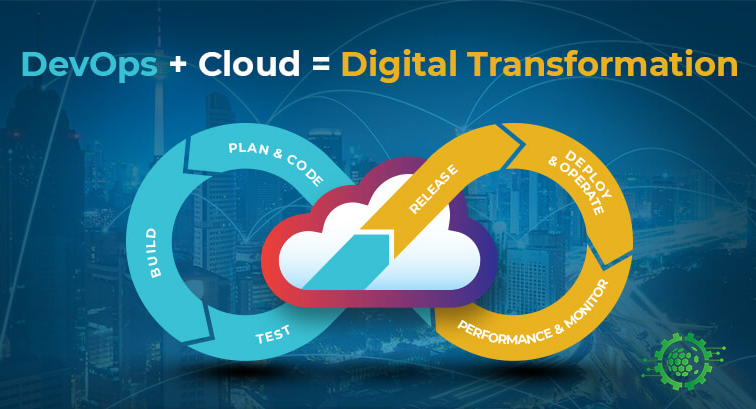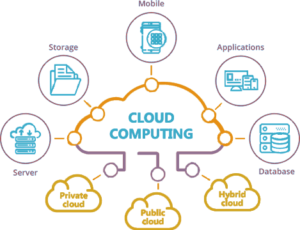Digital Transformation: Journey to the Cloud and DevOps Approach
DevOps and cloud computing have become two of the most important ways companies can achieve much needed Digital transformation. DevOps is about the process, culture, and improvement, while cloud computing is about technology and services. The relationship between the two can be life changing and transformative.

This article is divided into two parts, the journey to the cloud and the impact of DevOps on this transformation. Let’s see how, both the DevOps and cloud are able to work together to offer greater effectiveness and business impact.
What is Digital Transformation?
Do you remember those days when if you accidentally dropped your computer or hard drive, you either lost all your data or had to go to a data recovery center to try to salvage whatever was left of it? Thankfully, those days are behind us now, and even if we lose access to the machine, all our data is secure in the cloud, easily accessible from all over the globe. The journey from data recovery centers to the cloud is an example of Digital Transformation.
In simple words, digital transformation is the integration of technology into all elements of a business- the way of thinking and the way of operating. This transformation pushes the business to be innovative, efficient, and customer-centric. It requires businesses to utilize technologies like cloud or communication systems, accounting systems, artificial intelligence, document collaboration, etc. to improve their company and attract more customers. While the transformation begins with a problem statement, or aspiration, or even as a survival technique, it should always stay strong in the face of failure. This transformation is not a mere change of working style, it is more of a change in culture and beliefs. It is an ongoing journey, a marathon instead of a sprint.
The Journey to the Cloud – A Digital Transformation Journey
The journey to the cloud began when businesses began to expand, with hundreds of employees and hundreds of customers, all needing to interact or access information. Due to a lack of proper communication systems, as well as, database management systems, work productivity started to decrease. With the introduction of cloud-based communication systems that provided all members’ access to a single platform for instant messaging, phone calls, video calls, and conferencing, employees were saving time and displayed improved job performances.

Similarly, with the introduction of cloud-based databases, like Amazon Web Service, Oracle Database, Microsoft Azure, data extraction, insertion, and manipulation became effortless. Not to mention data analysis, finding insights, and evaluation of business techniques became possible which allowed companies to maximize their performances and revenue.
One of the major reasons behind the shift to the cloud was security; the cloud host provides heavily reinforced security, which is much more efficient than a traditional in-house system. While most businesses prefer not to consider the risk of internal data theft, the fact is that an alarmingly high percentage of data theft occurs within the company and is committed by employees. When this is the case, keeping critical information offsite might actually be safer. Moreover, the encryption of data being transferred over networks and kept in databases also provides increased security. By encrypting data, hackers and anyone who aren’t entitled to see it have a harder time accessing it.
As discussed in a previous blog, disaster recovery is essential for a business and cloud-based services provide for rapid data recovery in a variety of emergency situations, including natural catastrophes and power outages.
[Learn More: Disaster recovery via the DevOps approach]
Impact of DevOps on Digital Transformation
With this advancement in business, customer expectations rose, they anticipated the best and due to a variety of options available, they never had to settle for less. In this dawn of digital transformation, for businesses to keep up, they had to satisfy their customers by accelerating company ideas, lowering response time, and devising innovative solutions to challenges; that’s where DevOps comes in. DevOps is an approach for delivering value to end-users quickly and often. Cloud-native technologies, as well as a realignment of tools, people, and culture, are being used to accomplish this.
For a company to digitally transform, it requires all its employees to adopt the cultural change it comes with; it requires them to let go of the old business practices and break down organizational silos. It requires all teams to work collectively, like the Development and Operations team, to figure out what is or is not working for the business.
When the Development and Operation teams work together using cloud computing; it ensures efficient collaboration and improved productivity that allows organizations to release new updates to their customers faster. DevOps prevents waste of people and tools through a better focus on what works for the company; this frees up resources that can then be deployed to work on more important features. The faster releases of technology also allow for easier software innovation that would not have been guaranteed without DevOps or Cloud Computing.
To move ahead of the competition, businesses need to work efficiently, this can be done by automating workflows to reduce redundant and manual tasks. DevOps prioritizes automation as much as possible; it promotes automating the pipeline for continuous integration (CI) and continuous delivery (CD) directly from the repository, then automating testing and deployment. CI/CD is accomplished by embracing the cloud and modernizing architectures and applications through strategies such as containerization and micro-services.
Conclusion
Digital transformation is business transformation. It’s a shift motivated by a simple desire to improve work for everyone, from employees to consumers. The factors we just discussed are some of the most important factors driving the huge changes that are currently sweeping the corporate sector. For each business to stay ahead in the race, they need to utilize all the resources available, to the fullest extent and that means to combine DevOps and Cloud and avail the most out of this power-house combination.
If you are seeking ways to digitally transform your business to leverage technology as a source of growth and innovation, We can help!
Contact us to find out more: info@planetofit.ca

